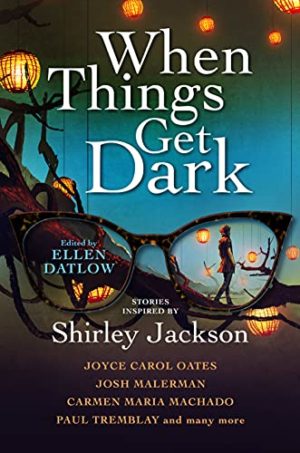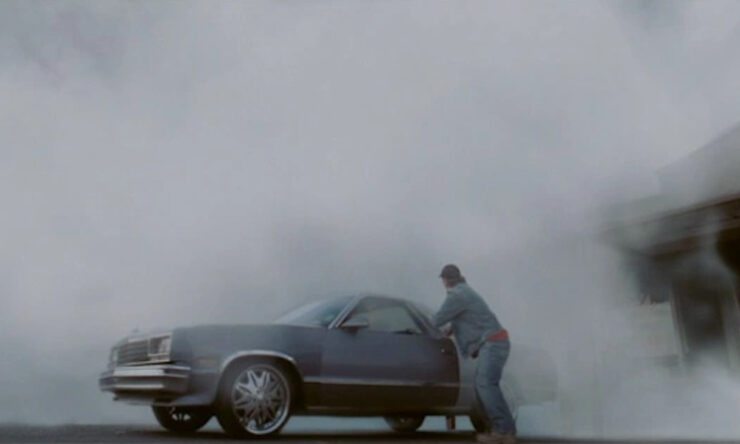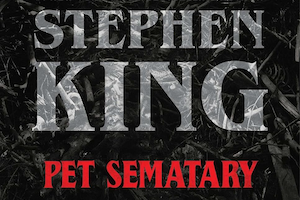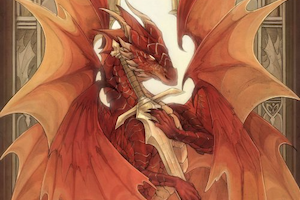Welcome back to Reading the Weird, in which we get girl cooties all over weird fiction, cosmic horror, and Lovecraftiana—from its historical roots through its most recent branches.
This week, we cover Genevieve Valentine’s “Sooner or Later Your Wife Will Drive Home,” first published in Ellen Datlow’s 2021 anthology: When Things Get Dark: Stories Inspired by Shirley Jackson. Spoilers ahead!
“A dad can kill his daughter and probably never kill again, but Bet was smart enough not to say.”
A rainstorm forces Bess’s car into off-road mud. She’ll never tell her father—he dislikes women driving. Bess drove the factory carpool accident-free for three years, but you don’t mention such things now that the men are back from the war.
She finds a gas station, but doesn’t knock until she looks presentable: stocking seams straight, clothes brushed off. She understands “the duty to pay all the attentions to herself that nature hadn’t” to get men’s respect.
A young acne-scarred man answers her tap. Bess explains her situation, and he lets her inside. The station’s neon signs go out. She and the man are alone.
***
Lizzie’s Beetle is stuck in mud. Her father taught her how to change tires and break an attacker’s nose, but he also instilled a fear of leaving her car when stranded at night. She hunkers down in her sleeping bag. Her father never liked her buying a Beetle. Lizzie herself resented VW ads implying women were poor drivers, but the Beetle was a car she could push by herself. Usually.
A guy in a truck stops. Her father helps women in vehicular distress. This guy looks fatherly. So when he offers a ride, Lizzie clamps a wrench under her arm (just in case) and accepts his offer.
***
Betty is driving to her sister’s house. She’s promised her brother not to “lose her head about going all alone,” so when her car makes alarming noises, she pulls into a motel. She can’t risk getting road-stranded; her brother’s warned her not to trust male Samaritans, even policemen. She doesn’t like the look of the motel or its occupants; instead she spends the night at a nearby restaurant, where the waiter appears “like magic” whenever she wants something. She never even feels him watching her.
***
Liz’s husband won’t attend her brother’s graduation. He’s sour when he visits her family. He’s also sour about her going alone, but her father expects her “for the pictures.” Her husband throws the car keys so hard they sting her palm, and she leaves with hands trembling. She’s not afraid of driving on interstates, where there are pullovers and policemen. But going to the graduation is “giving in to something,” as staying home would be “giving in to something else.” What she really wants is to drive at liberty, with no one demanding things, but she’s been taught to suppress such “tantrums.”
She drives white-knuckled, not stopping. She has to get home, because they expect her.
***
Ellie’s boyfriend has again vented his rage by throwing her books around, before heading to a speakeasy. To facilitate cleanup, she twists back her long hair. She envies girls with bobbed hair — but her boyfriend likes hers long, joking it looks “virginal.” The joke’s that she’s already “given up the goods” and dropped out of high school to live with him.
She imagines driving west, starting over from nothing. She worries about taking her boyfriend’s much-loved car, but riding a bus with strange men is unsafe. Still. She could go to Chicago, where young women live alone in boarding houses. In Chicago, Ellie could have bobbed hair.
She’s packing when her boyfriend comes home.
***
Her car screwed and her phone dead, Bet parks beside the highway and crouches out of sight. Accept help from random dudes, you’ll end up like the girl from high school whose body was found in the river. Afterwards, “it was a whole Thing just to go outside,” with people assuming more murders would follow. Bet’s friends’ dads disliked them going away to college. Bet’s dad left when she was four, so she’s escaped that weirdness. She thinks but doesn’t say “A dad can kill his daughter and probably never kill again.”
Bet’s researching old ads that make women sound helpless, like the one touting Volkswagen’s cheap replacement parts, accompanied by an image of a wrecked car, because “sooner or later, your wife will drive home one of the best reasons for owning a Volkswagen.”
Someone knocks on Bet’s window, and she almost pepper-sprays him. But the knocker’s a cop, who laughs “like this was a game they’d agreed on.” She goes cold and gets out, leaving the spray behind—there’s “no point in giving him something to arrest her for.”
***
Buy the Book
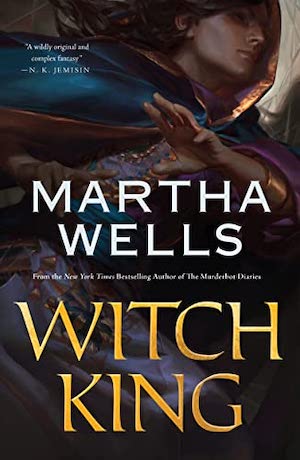

Witch King
Eliza’s worn a path through the woods behind her house, imagined following it to the road and hitchhiking away. She hasn’t tried since her brother caught her. One night she finds a dead woman on the path, naked except for one dangling shoe. When the coroner turns the body over, he exposes a back torn to shreds. A detective decries how “Women are always trying to travel alone.” He asks Eliza if she heard anything.
She hasn’t. Her brother’s been gone for five days, and it’s been so quiet. She’s slept soundly.
***
Elizabeth’s husband loves old ghost movies. He doesn’t love her indifference to them; occasionally she feigns fear by holding his hand. Conversely he’s annoyed, on a visit to her dying mother, to find Elizabeth crying in the kitchen.
On their way home, he stops at a cinema. A little mean, yes, but Elizabeth’s “been thinking of ghosts all weekend anyway.” She angers him by refusing to take his hand. On screen, women talk about men. One man is a killer, and one woman must die. Actresses playing the living are doomed to screams and fainting, while actresses playing ghosts have no fear.
The movie murderer’s caught. The ghost women vanish. Elizabeth’s husband snaps that he hopes she enjoyed the movie. Elizabeth doesn’t respond. She’s thinking about “how easy it was for a woman to disappear, once the right man was dead.”
This Week’s Metrics
What’s Cyclopean: Two occupied hotel rooms are like “yellow teeth in an empty mouth.” But they aren’t where the danger lies.
The Degenerate Dutch: Bet does a project on “old ads that made women sound totally hopeless.” She thinks it will be fun, but it’s just anger-inducing. She almost sells her new-model VW Beetle over the titular ad copy.
Weirdbuilding: Elizabeth’s husband loves old ghost movies, where the women are dead and disappear when their murderers are caught. She thinks about how the dead have nothing to fear, and can say aloud who hurt them.
Ruthanna’s Commentary
I’ve been enjoying our selections from When Things Get Dark. There are so many aspects of Jackson’s work that a story might run with, facets of the supernatural, of gender, of relationships, of uncertain realities. This week’s story gets at a particular sense of unresolved discomfort that I’ve learned to expect from Jackson (as well as at gender, relationships, and uncertain realities). Jackson was a master at stories—“The Daemon Lover,” “The Witch,” “The Summer People”—where all that happens on screen is that people don’t act right, but something truly terrible is waiting just off-screen, in the corner of your eye.
I spent most of this story waiting for the other shoe to drop, knowing it might not drop where I could see it. (And then it does drop, unseen, in a river. Ouch.) Waiting for all the Elizabeths to turn out to have some relationship to each other, for the time jumps to fall into a comprehensible pattern—no. The point here is not for everything to resolve into a clear picture. The point is men’s distrust in women, women’s learned fears, men making sure that no choice is guaranteed to be the right choice no matter how sensible. The point is fury at all those advisors who pretend that if you pull over, wear a long skirt, carry mace, placate male anger, that you’ll be okay. The point is that other people—men, frequently—can still choose harm in spite of all that. It isn’t that women are helpless or incompetent, as the old Volkswagen ad suggests. It’s that no one can make choices that keep them perfectly safe, and fuck everyone who’s ever made themselves feel safer by blaming the victim.
The point, too, is that history isn’t just history. That patterns do repeat, and that it doesn’t make them meaningful.
One pattern that does come clear is the spiral in from stranger danger to the danger of those you know very, very well. We all hear that most assaults come from lovers, spouses, parents, teachers—and we remain deeply uncomfortable with the idea that we can’t just tell our children to avoid the places where bad people go. To not drive alone, or to drive away, or to find a safe place when danger rears. To trust their instincts or ignore them. To leave the party or stay off the road. To trust no one, or to trust authorities to keep them safe.
Bet gets at this contrast, with her childhood experience of a murder leading to widespread fear and paranoia. Parents want to protect their kids, and kids pick up on the idea that everyone is dangerous. It’s a disturbing view of humanity, “like killing young women was something everybody was secretly itching to do and after somebody broke the seal on that all the adults assumed it was open season.” The adults presumably have slightly more nuanced views of the danger—at the least, most of them know that they don’t have such an itch. Many of them would probably trust cops, too. (When I was in graduate school on Long Island, there was an ongoing problem with cops pulling young women over and making them strip.)
The central question of horror is what’s frightening, and how you should react to frightening things. (“What’s the point of a scary movie if you won’t be afraid?”) Shirley Jackson knew that the answer could involve blood-drenched clothing in a house that’s playing with your head, or an awkward conversation on a train. That violations of social norms can feel just as reality shaking as violations of physical law. Would you rather successfully wrestle an invisible monster, or have all social support withdrawn from your life when you stay late at your summer rental?
Bess, Lizzy, Betty, Liz, Ellie, Bet, Eliza, Elizabeth. Bess is just post World War II, Bet has a cell phone. Liz tries to do what’s demanded of her; Ellie tries to leave. Sooner or later, a woman will make a choice, and get mocked for it. Her husband, and the people writing the article or the ad copy, know they would have done better.
Anne’s Commentary
Valentine’s title is cryptic until the text reveals that it comes from an old Volkswagen advertisement. My search for this outstanding example of automotive sexism was brief—instantly Google served up multiple images of the 1960s ad. You can buy it as an archive-quality poster as well as on T-shirts, coffee mugs, tapestries, cell phone covers and duvet covers. Seriously, someone wants to snuggle under a banged-up Beetle and copy that probably drew guffaws from its creator madmen but which now reads so, well, cultural nadir of its decade? Besides the bits Valentine quotes are these gems: “Women are soft and gentle, but they hit things,” and “So when your wife goes window-shopping in a Volkswagen, don’t worry.”
Don’t worry about your repair bill, but maybe you should worry about your soft and gentle wife hitting you, with a tire iron.
Two women in Valentine’s mini-narratives come ready to defend themselves, Bet with pepper spray and Lizzie with a wrench. The rest are armed only with smiles, politeness, and (they hope) winning vulnerability. It’s uncertain whether any of them survive their encounters with male darkness. They have been well-schooled not to.
The mini-narratives are braided together by both theme and particulars. Each protagonist answers to a nickname-variation of Elizabeth; in the final section, Elizabeth herself appears. A trip by car figures in each. The antagonists are men in authority or strangers with the upper hand because the woman needs them (the fatherly truck driver, the mechanic and waiter.) Time periods vary, with Valentine providing decade clues. Bess drove a factory carpool before “the men were all at home” again. That indicates a post-WWII setting. Lizzie drives a Beetle, popular in the 1960s, which is when the “Sooner or later” ad that she despises ran. Betty wears the 1950s-fashionable loafers and circle skirt. She prides herself on being a “university girl” but finds “bohemian” girls de trop. Liz’s husband rents videos, a format biggest in the 1980s. Ellie’s mention of speakeasies and bobbed hair shout 1920s. Bet may own a Beetle, but she’s no “shitty wife in a Volkswagen ad from forty years ago.” Add her cell phone (dead), and she’s in the 2000s. The Eliza and Elizabeth sections lack specific clues but feel roughly contemporary.
These time switches illustrate how little core sex dynamics have changed. Fathers and brothers can be overprotective and possessive; the worst is Eliza’s brother, who effectively imprisons her at home and may be the “Cinderella Killer.” Bet wonders whether the “serial killer” of a girl in her town wasn’t the girl’s father. Liz angers her husband by going to her brother’s graduation, but her father’s commanded her presence. She’s caught between men, never free from expectations. Ellie’s live-in boyfriend has so far tossed her books instead of Ellie, but that’ll probably change when he catches her packing to leave. Elizabeth’s husband is a master manipulator. He drives her to her sick mother because women shouldn’t travel alone, then sulks because he’s bored. He chastises Elizabeth for crying over her mother, then accuses her of being “made of lead” because she’s not scared by ghost movies. He drags her to a ghost movie on their trip home, then snarks that he hopes she enjoyed it, as if going was her idea.
While we’re left to fear the worst for the women in the other narratives, Elizabeth may get the better of her male adversary. Watching the latest ghost movie, she realizes the living women have to scream and faint and plead with dismissive men, whereas the ghost women get to disappear, to be free, “once the right man was dead.” Elizabeth and her husband face a long ride home from the cinema on this dark, rainy night. Eliza knows there are “so many empty places” a woman could be killed. Maybe there’s room in one of those empty places for a male corpse? [RE: And then… his wife, not him, will drive home. Aha!]
How does “Sooner or Later” fit in When It Gets Dark, an anthology of Shirley Jackson tributes? It shares with Jackson’s best dark stories a slow build-up of the menace inherent in everyday relationships and chance encounters; of the tension between the urge to stay safely put and the longing to venture forth. The horror, supernatural or not, is that neither option may be a good choice, but how will you know unless like Eleanor Vance you get in that car and drive, drive on to the end of the world, or Hill House, whichever comes first?
Next week, join us for Chapter 7 of Hilary Mantel’s Beyond Black.
Ruthanna Emrys’s A Half-Built Garden is out! She is also the author of the Innsmouth Legacy series, including Winter Tide and Deep Roots. You can find some of her fiction, weird and otherwise, on Tor.com, most recently “The Word of Flesh and Soul.” Ruthanna is online on Twitter and Patreon, and offline in a mysterious manor house with her large, chaotic, multi-species household outside Washington DC.
Anne M. Pillsworth’s short story “The Madonna of the Abattoir” appears on Tor.com. Her young adult Mythos novel, Summoned, is available from Tor Teen along with sequel Fathomless. She lives in Edgewood, a Victorian trolley car suburb of Providence, Rhode Island, uncomfortably near Joseph Curwen’s underground laboratory.










